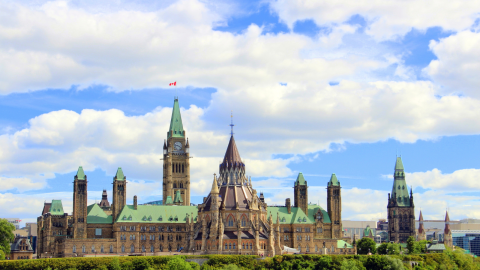
This article originally ran in the Hill Times.
Despite intense international pressure, Canada is doing the right thing by pressing ahead with plans to tax online multinational corporations.
Other governments this month agreed to pause their national digital tax plans for another year in favor of waiting for a global deal on taxing multinational corporations through the OECD.
While Finance Minister Chrystia Freeland said a multilateral agreement through the OECD would be preferred, Canada must press ahead with plans to ensure that large corporations “pay their fair share” and bring in a digital services tax in January 2024.
Canada’s refusal to shelve its digital tax may provoke the ire of some U.S. policymakers and business lobby groups, but Minister Freeland should be congratulated for not backing down in the face of international pressure.
For years, large digital companies such as Meta and Amazon have been able to avoid tax worldwide by shifting profits to low-tax jurisdictions, bleeding governments of revenue and creating an unfair playing field for domestic companies.
A tax on digital corporations is long overdue in Canada. The Liberal government was already well behind the U.K., France and other G20 peers when it first proposed the tax in its 2019 election platform.
Several European governments have already introduced their own digital taxes on tech giants and Canada was supposed to bring in a digital tax in 2022, but the government held off to await a multilateral deal on taxing multinationals under the OECD, which has been rewriting global tax rules.
Noting that the government had already delayed its digital tax, Minister Chrystia Freeland said in a statement that “Canada cannot support the extended standstill.”
Canada’s 3% digital tax would apply to revenues of online-based businesses with global revenue of over €750 million and annual revenue from Canadian users of more than $20 million.
Canada’s Parliamentary Budget Officer has calculated the tax would generate $1 billion annually. Other estimates have shown that under Canada’s proposed national digital services tax, companies like Amazon would pay 50-100% more than they would under an OECD tax deal.
It is increasingly important for Canada and other countries to strengthen domestic tax rules after years of delayed discussions through the OECD to fix the global tax system have failed to materialize in meaningful improvements.
Experts estimate that $1 trillion continues to be lost each year to corporate profit-shifting. At a time when governments face no shortage of spending priorities –from climate action to pandemic recovery— countries cannot afford to postpone unilateral action to recover tax revenues.
Policy changes at the national level can also advance global progress. The adoption of digital taxes by other G20 countries were critical to advancing international discussions on modernizing tax rules for tech multinationals.
A digital tax is one policy tool that the Canadian government can use to make progress where it has stalled at the OECD, but there are others it should consider.
Greater transparency of multinationals’ tax and financial information is another powerful deterrent to profit-shifting. Other jurisdictions such as Australia and the EU are already far ahead of Canada in strengthening legislation for corporate tax disclosure.
Requiring multinationals to publicly report country-by-country financial information would allow the public to see how much tax is being paid – or avoided. This would not only prevent corporations from dodging taxes but assist in the administration of Canada’s digital tax.
The lack of progress from the OECD should also motivate Canada to support a more inclusive process of fixing the global tax system through a new UN convention and tax body.
Finance Minister Freeland will face significant pushback ahead of Canada’s January 2024 digital tax, but she should be commended for standing firm on plans to make some of the world’s most profitable and powerful corporations pay their share.
Parliament hill image source here.
